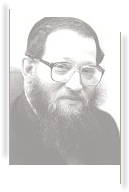
Good Shabbos Everyone. In this week's parsha Chayei Sorah, we read about the deaths of Avrohom and Sorah, who were the father and mother of the Jewish people. The Rabbis tell us: "The deeds of fathers are an example for the children." Because we are all children of Avrohom and Sorah, we can learn from their actions.
One of the ways that Avrohom and Sorah distinguished themselves is in the decision they took to go against the cherished ideals of society and to build their own lives based on a belief in the One G-d. For this reason is Avrohom referred to in the Torah as "Ha'Ivri" - "The Hebrew". Rashi explains that the word "Ivri" is related to the root of the word meaning "on the other side."
It is as if Avrohom put himself on the other side of world opinion. The whole world at the time worshipped idols. Yet Avrohom believed in the One G-d. That is why we, the children of Avrohom, are called Hebrews, because we follow in the footsteps of a man who set himself apart from the entire world. Avrohom was not intimidated by the fact that he held a minority opinion. So too can we be inspired by the example of our forefathers and mothers who made the decision to worship Hashem against the popular view at the time.
The following inspirational story will encourage us even more to rededicate our lives to Torah and mitzvahs and the service of Hashem.
After the concluding prayer, Dan quickly walked to the front of the shul in Jerusalem. Dan said "Good Shabbos" to the rabbi and a few other people he knew, and at once made his way toward the back. It was time to get home to make Kiddush for the family. On his way out, a sudden impulse struck him and he turned around to watch the people filing out. His eyes slowly scanned the shul. Was there anyone who needed a place to eat?
Who's that sitting toward the side wall? I know almost everyone here, and I don't believe he's been here before. Thought Dan to himself. Dan approached the young man, scanning him with an experienced eye. Dungarees, backpack, dark skin, curly black hair -- looks Sephardi, maybe Moroccan. He extended his hand in warm welcome. "Good Shabbos. My name is Dan Eisenblatt. Would you like to eat at my house tonight?"
The young man's face broke in an instant from a worried look to a toothy smile. "Yeah, thanks. My name is Machi." The young man picked up his backpack, and together they walked out of the shul. A few minutes later they were all standing around Dan's Shabbos table.
As soon as the family started singing Shalom Aleichem, Dan noticed that his guest wasn't singing along. "Maybe he's shy, or can't sing," he surmised. The guest gave another one of his toothy smiles and followed along, limping badly but obviously trying his best.
Even after the meal began and the guest had relaxed somewhat, he still seemed a bit fidgety and was mostly silent. Dan picked up the signal, kept the conversation general and centered his remarks on the weekly Torah portion, mixed with small talk about current events.
After the fish, Dan noticed his guest leafing through his songbook, apparently looking for something. He asked with a smile, "Is there a song you want to sing? I can help if you're not sure about the tune." The guest's face lit up, a startling change. "There is a song I'd like to sing, but I can't find it here. I really liked what we sang in the synagogue tonight. What was it called? Something 'dodi.'" Dan paused for a moment, on the verge of saying, "It's not usually sung at the table," but then he caught himself. "If that's what the kid wants," he thought, "what's the harm?" Aloud he said, "You mean Lecha Dodi. Wait, let me get you a siddur."
Once they had sung Lecha Dodi, the young man resumed his silence until after the soup, when Dan asked him, "Which song now?" The guest looked embarrassed, but after a bit of encouragement said firmly, "I'd really like to sing Lecha Dodi again." Dan was not really all that surprised when, after the chicken, he asked his guest what song now, and the young man said, "Lecha Dodi, please."
"Don't you want to sing something else?" he suggested gently. His guest blushed and looked down. "I just really like that one," he mumbled. "Just something about it -- I really like it." In all, they must have sung "The Song" eight or nine times. Dan wasn't sure -- he lost count.
Later, when they had a quiet time to talk, Dan said, "I was just wondering, Where are you from?" The boy looked pained, then stared down at the floor and said softly, "Ramallah." Dan's heart skipped a beat. He was sure he'd heard the boy say "Ramallah," a large Arab city in the PLO controlled area north of Jerusalem. He quickly caught himself and then realized that he must have said Ramleh, an Israeli city.
Dan said, "Oh, I have a cousin there. Do you know Ephraim Warner? He lives on Herzl Street." The young man shook his head sadly. "There are no Jews in Ramallah." Dan gasped. He really had said "Ramallah!" His thoughts were racing. Take a deep breath and let's get this straightened out. (In the context of the political history and the current events in Israel, this was a highly unusual occurrence.) Giving his head a quick shake he told the boy, "I'm sorry, I'm a bit confused. And now that I think of it, I haven't even asked your full name. What is it, please?"
The boy looked terrified for a moment, then squared his shoulders and said quietly, "Machmud Ibn-esh-Sharif." Machmud was looking even more terrified now; obviously he could tell what Dan was thinking. Hurriedly he said, "Wait! I'm Jewish. I'm just trying to find out where I belong."
Dan stood there speechless. What could he say? Machmud broke the silence hesitantly: "I was born and grew up in Ramallah. I was taught to hate my Jewish oppressors, and to think that killing them was heroism. But I always had my doubts. I used to sit and wonder, Weren't the Yahud (Jews) people, too? Didn't they have the right to live the same as us? If we are supposed to be good to everyone, how come nobody includes Jews in that? "I asked these questions to my father, and he threw me out of the house. Just like that, with nothing but the clothes on my back.
By then my mind was made up: I was going to run away and live with the Yahud, until I could find out what they were really like." Machmud continued: "I snuck back into the house that night, to get my things and my backpack.
My mother caught me in the middle of packing. She looked pale and upset, but she was quiet and gentle to me, and after while she got me to talk. I told her that I wanted to go live with the Jews for a while and find out what they're really like, and maybe I would even want to convert. "She was turning more and more pale while I said all this, and I thought she was angry, but that was not it. Something else was hurting her, and she whispered, 'You do not have to convert. You already are a Jew.' "I was shocked. My head started spinning, and for a moment I could not speak.
Then I stammered, 'What do you mean?' "'In Judaism,' she told me, 'the religion goes according to the mother. I'm Jewish, so that means you're Jewish.' "I never had any idea my mother was Jewish. I guess she didn't want anyone to know. She sure didn't feel too good about her life because she whispered suddenly, 'I made a mistake by marrying an Arab man. In you, my mistake will be redeemed.' "My mother always talked that way, poetic-like.
She went and dug out some old documents and handed them to me: things like my birth certificate and her old Israeli ID card, so I could prove I was a Jew. I've got them here, but I don't know what to do with them. "My mother hesitated about one piece of paper. Then she said, 'You may as well take this. It is an old photograph of my grandparents, which was taken when they went looking for the grave of some great ancestor of ours. They went up north and found the grave, and that's when this picture was taken.'"
Dan gently put his hand on Machmud's shoulder. Machmud looked up, scared and hopeful at the same time. Dan asked, "Do you have the photo here?" The boy's face lit up. ""Sure! I always carry it with me." He reached in his backpack and pulled out an old, tattered envelope. Dan gingerly took the photo from the envelope, picked up his glasses and looked carefully at it.
The first thing that stood out was the family group: an old-time Sephardi family from the turn of the century. Then he focused on the grave they were standing around. When he read the gravestone inscription, he nearly dropped the photo. He rubbed his eyes to make sure. There was no doubt. This was a grave in the old cemetery in Tzfas, and the inscription identified it as the grave of the great Kabbalist and tzaddik Rabbi Shlomo Alkabetz -- the author of "Lecha Dodi."
Dan's voice quivered with excitement as he explained to Machmud who his ancestor was. "He was a contemporary of the Arizal, a great Torah scholar, a tzaddik, a mystic. And Machmud, your ancestor wrote that song we were singing all Shabbos: Lecha Dodi!" This time it was Machmud's turn to be struck speechless.
Dan slowly stood up, still in awe about what had happened. He extended his trembling hand and said, "Welcome home, Machmud. Now how about picking a new name for yourself?" (From: Monsey, Kiryat Sefer, and Beyond, Reb Zev Roth, the names have been changed. verified by Reb Mordechai Neugroschel, who heard it from the host himself.)
Machmud surely risked his life to take the path that he did. Through Machmud's heroism we are reminded of the characteristics of Avrohom and Sorah, who put themselves on the other side of world opinion. When we see the self-sacrifice that one Jew went through in order to observe his faith, we can be inspired to put even more effort into our own service of Hashem. Good Shabbos Everyone
from a regular email that I get

























































